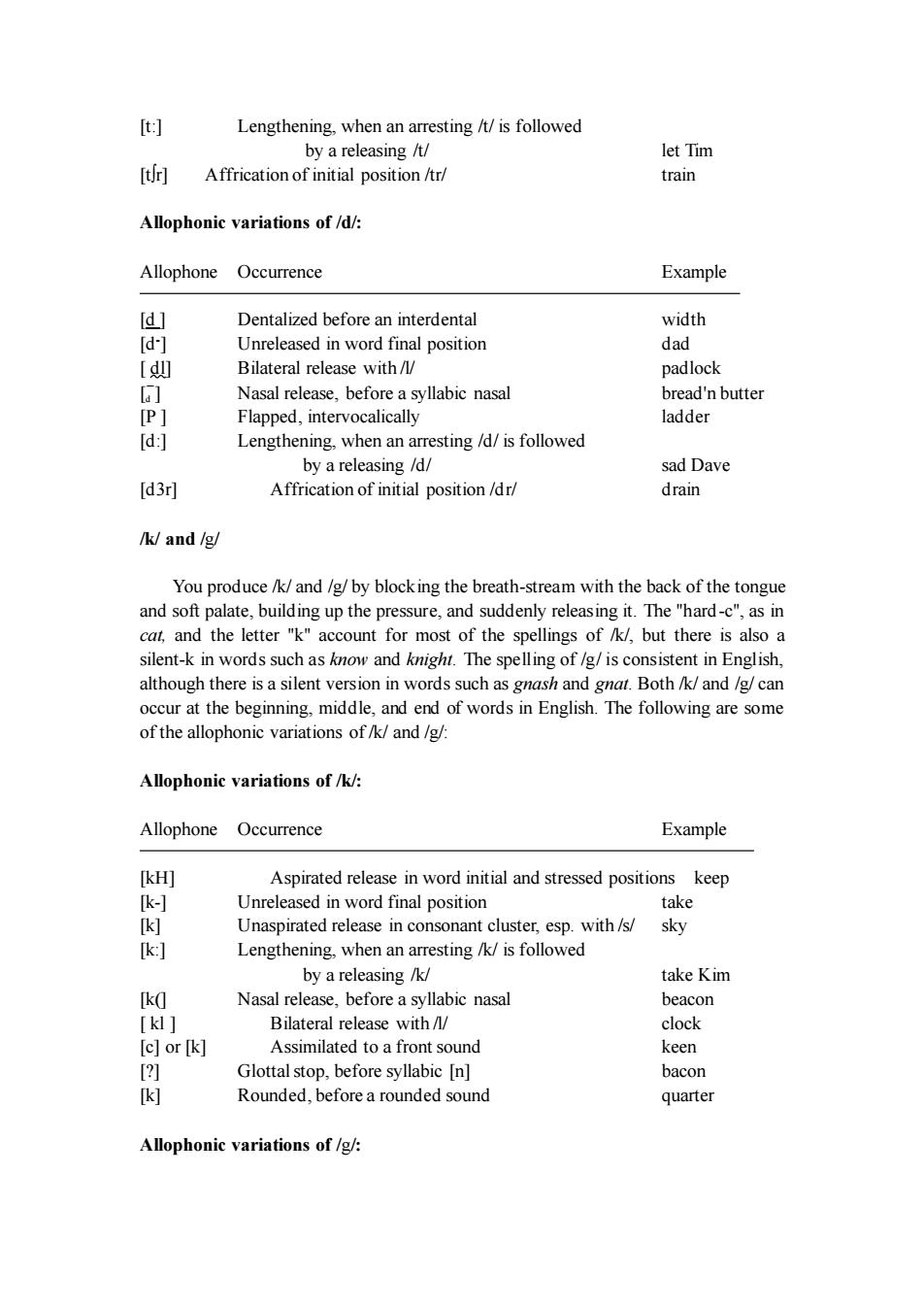正在加载图片...

Lengthening.when an arresting/t/is followed releasing 时 Affricationof initial position /r/ Allophonic variations of/d/: Allophone Occurrence Example @ Dentalized before an interdental width d Unreleased in word final position dad Bilateral release with// padlock Nasal release,before a syllabic nasal bread'n butter Flapped,intervocalically ladder ld:] Lengthening.when an arresting /d/is followed by a releasing /d/ sad Dave [d3r] Affrication of initial position/dr/ drain /k/and /g/ You produce /k/and /g/by blocking the breath-stream with the back of the tongue and soft palate,building up the pressure,and suddenly releasing it.The"hard-c",as in cat.and the letter "k"account for most of the spellings of /k/,but there is also a silent-k in words such as know and knight.The spelling of/g/is consistent in English, athough there is a silent ver at.Both/k/and /g/ca occur at the beginning,middle,and end of words in English.The following are some of the allophonic variations of/k/and/g/: Allophonic variations of/k/: Allophone Occurrence Example [kH] Aspirated release in word initial and stressed positions keep k-1 Unreleased in word final position take k Unaspirated release in consonant cluster,esp.with/s/sky Lengthening.when an arresting/k/is followed by a releasing /k/ take Kim [k Nasal release,before a syllabic nasal beacon [k] Bilateral release with// clock [c]or [k] Assimilated to a front sound keen Glottal stop,before syllabic bacor Rounded,beforea rounded sound quarter Allophonic variations of/g/: [t:] Lengthening, when an arresting /t/ is followed by a releasing /t/ let Tim [t∫r] Affrication of initial position /tr/ train Allophonic variations of /d/: Allophone Occurrence Example [d ] Dentalized before an interdental width [d- ] Unreleased in word final position dad [ dl] Bilateral release with /l/ padlock [ - d ] Nasal release, before a syllabic nasal bread'n butter [ ] Flapped, intervocalically ladder [d:] Lengthening, when an arresting /d/ is followed by a releasing /d/ sad Dave [d3r] Affrication of initial position /dr/ drain /k/ and /g/ You produce /k/ and /g/ by blocking the breath-stream with the back of the tongue and soft palate, building up the pressure, and suddenly releasing it. The "hard-c", as in cat, and the letter "k" account for most of the spellings of /k/, but there is also a silent-k in words such as know and knight. The spelling of /g/ is consistent in English, although there is a silent version in words such as gnash and gnat. Both /k/ and /g/ can occur at the beginning, middle, and end of words in English. The following are some of the allophonic variations of /k/ and /g/: Allophonic variations of /k/: Allophone Occurrence Example [k] Aspirated release in word initial and stressed positions keep [k-] Unreleased in word final position take [k] Unaspirated release in consonant cluster, esp. with /s/ sky [k:] Lengthening, when an arresting /k/ is followed by a releasing /k/ take Kim [k(] Nasal release, before a syllabic nasal beacon [ kl ] Bilateral release with /l/ clock [c] or [k] Assimilated to a front sound keen [] Glottal stop, before syllabic [n] bacon [k] Rounded, before a rounded sound quarter Allophonic variations of /g/: